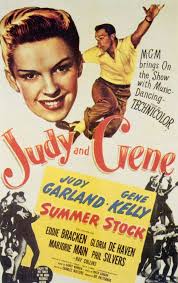In 'Judy by the Numbers' Anne Marie looks back at Garland's career through key songs
 By the time Judy Garland turned 28, her entire adult life and her entire star persona had been a product of MGM. In 1950, Judy Garland's image - as cultivated by MGM and the Freed Unit - was of an exuberant talent, small in stature but big in heart and voice; a buoyant box office sensation. However, the reality was different. In the 13 months between the release of In The Good Old Summertime and Summer Stock, Judy Garland fought drug addiction, rehab, an increasingly strained marriage, an unsympathetic studio, and a suicide attempt that made headlines worldwide. Filmed before her attempt but released two months after it, Summer Stock is a record of the conflict between the image of Judy Garland and the reality of Frances Gumm.
By the time Judy Garland turned 28, her entire adult life and her entire star persona had been a product of MGM. In 1950, Judy Garland's image - as cultivated by MGM and the Freed Unit - was of an exuberant talent, small in stature but big in heart and voice; a buoyant box office sensation. However, the reality was different. In the 13 months between the release of In The Good Old Summertime and Summer Stock, Judy Garland fought drug addiction, rehab, an increasingly strained marriage, an unsympathetic studio, and a suicide attempt that made headlines worldwide. Filmed before her attempt but released two months after it, Summer Stock is a record of the conflict between the image of Judy Garland and the reality of Frances Gumm.
The Movie: Summer Stock (1950)
The Songwriters: Harold Arlen (music), Mack Gordon (lyrics)
The Players: Judy Garland, Gene Kelly, Eddie Bracken, Gloria de Haven, directed by Charles Walters
The Story: "Get Happy" is the number that shouldn't be from the movie that shouldn't exist. Neither Judy Garland nor Gene Kelly was supposed to be in Summer Stock. Judy had just dropped from Annie Get Your Gun and entered rehab, and Gene's star was rising with Arthur Freed. However, Joe Pasternak coaxed them into another picture, a return to form based on the old Rooney/Garland "let's put on a show!" model. Though it was intended to be a triumphant return, ultimately Judy lags through much of Summer Stock, which needs her energy to carry through a plodding plot. She looks and sounds a little slower, though sources disagree on why - either she was recovering from rehab or further spiralling into addiction.
In this context - and even out of it - "Get Happy" is a shock. Filmed months later at Judy's insistence, with design and directorial help from husband Vincente Minnelli, the number shows Judy shining like she hasn't in a while. She's sexy, she's witty, she's beaming, and she's urbane in a way that sticks out from her nostalgia-laced image. Even without the maelstrom of malady surrounding her, this would be a defining number for Judy. With this backstory, "Get Happy" takes on another meaning too - the "fix." If Summer Stock is the movie where Judy Garland's facade slipped, then "Get Happy" is the number that restored it, at least temporarily. Don't worry about the exhaustion! Judy's back, and better than ever. Forget your troubles!
The fix was a public one only. Though Summer Stock was a success, Judy and MGM parted ways in 1951. Divorced from the studio that had raised her, Judy Garland would find the 1950s to be both happy and heartbreaking. She would live out private struggles in public, and her image would change from child star to musical maiden to something more complicated. For some stars, the tragedies of their lives become as image-defining as their successes.